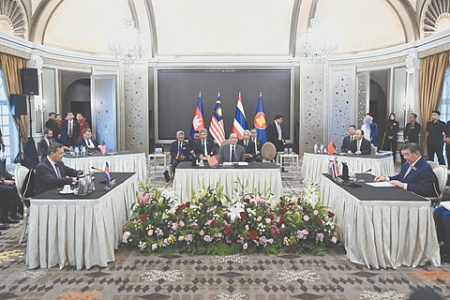
Thailand and Cambodia have agreed to an immediate and unconditional ceasefire following emergency talks in Malaysia, halting a deadly escalation of a long-standing border dispute. The agreement, brokered by Malaysia, came just days after U.S. President Donald Trump threatened to impose severe trade tariffs on both nations unless they ceased hostilities and returned to the negotiating table.
The diplomatic breakthrough occurred in Putrajaya, Malaysia, where acting Thai Prime Minister Phumtham Wechayachai and Cambodian Prime Minister Hun Manet met at the arrangement of Malaysian Prime Minister Anwar Ibrahim. The talks were convened under the banner of the Association of Southeast Asian Nations (ASEAN), which Malaysia currently chairs, underscoring the regional bloc’s mandate to maintain stability among its members.
This high-stakes diplomacy was prompted by a sudden and violent flare-up of a territorial conflict over ancient temples and adjacent lands. Last week, simmering tensions erupted into five days of intense fighting, involving heavy artillery and airstrikes. The clashes resulted in over 35 fatalities and forced more than 200,000 civilians to flee their homes, marking the most severe confrontation between the two neighbors since 2011.
While the looming loss of tourism revenue in the upcoming high season was a likely concern for both economies, the critical turning point appears to have been a direct intervention by Washington. On July 26, President Trump held calls with both leaders, warning that the U.S. would not pursue trade agreements and would impose punitive 36% tariffs on their goods starting August 1 if the fighting did not stop. The very next day, both Bangkok and Phnom Penh accepted Malaysia’s offer to mediate.
Despite the ceasefire being announced, details of the agreement remain scarce, as the leaders departed without taking questions from the press. Follow-up measures include a planned meeting of military commanders on July 29 and a subsequent discussion among military attachés led by the ASEAN chair on August 4. President Trump was quick to claim personal credit for brokering peace, even as reports of shelling continued on the day of the talks.
However, some analysts caution against viewing the U.S. intervention as purely peacemaking. Elena Fomicheva, a senior fellow at the Russian Academy of Sciences’ Institute of Oriental Studies, suggests President Trump is leveraging the conflict to advance American economic interests. According to Fomicheva, the U.S. has been pressuring Thailand to stop the re-export of Chinese goods, which circumvents American tariffs on Beijing. The threat of new duties against Thailand, a major trading partner, was therefore a powerful and effective tool of manipulation.
The durability of the ceasefire remains uncertain. Experts note that the peace is fragile and its longevity will depend on the competing interests of external powers like the United States and China, as well as volatile domestic political factors. The territorial dispute could easily be exploited by internal opposition groups, particularly in Thailand, to challenge the ruling government, potentially reigniting the conflict at any time.
